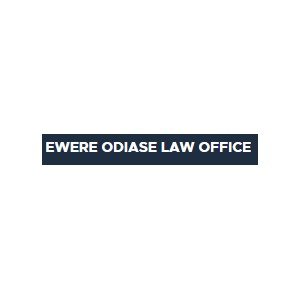Best General Litigation Lawyers in Asaba
Share your needs with us, get contacted by law firms.
Free. Takes 2 min.
List of the best lawyers in Asaba, Nigeria
Nigeria General Litigation Legal Questions answered by Lawyers
Browse our 1 legal question about General Litigation in Nigeria and read the lawyer answers, or ask your own questions for free.
- Damages claims from non payments of terminal benefits
- A new company taking over a liability ( with the terminal benefits from the former company inclusive) and refused payment for 4years plus and counting ..
-
Lawyer answer by Nomos Legal Practice
Hello and thank you for your interest to hire a lawyer to claim or receive damages from non-payments of terminal benefits for over 4 years and counting.We increase access to justice globally as we advise clients on their rights and...
Read full answer
About Litigation Law in Asaba, Nigeria
Litigation in Asaba, Nigeria, involves the process of taking legal action to resolve disputes within the judicial system. This process is often associated with civil litigation that encompasses disputes between individuals or organizations. Litigation can cover a wide array of issues such as contractual breaches, estate disagreements, tort claims, and more. Situated as the capital of Delta State, Asaba hosts several courts and legal institutions that cater to various facets of litigation. Given the complexity of the legal processes involved and the need for compliance with Nigerian laws, legal representation becomes crucial for anyone considering or involved in litigation.
Why You May Need a Lawyer
There are several common situations where individuals might require legal assistance related to litigation:
- When facing a lawsuit or planning to initiate legal action against another party.
- If you are dealing with contract disputes or breaches and need guidance on the enforceability of agreements.
- In cases of property disputes, such as issues arising from land ownership or tenancy agreements.
- For personal injury claims, where you seek compensation from another party for damages caused.
- If involved in family law-related litigation, including divorce or child custody issues.
- Needing representation for employment disputes, such as wrongful termination or workplace discrimination.
- To defend against criminal charges that require navigating the complexities of the criminal justice system.
Local Laws Overview
The legal landscape in Asaba is primarily governed by the Federal Republic of Nigeria's legal framework, augmented by state-specific laws and customary laws. Key aspects relevant to litigation include:
- Civil Procedure Rules: These govern the processes and regulations for civil litigation in the state's high courts.
- Land Use Act: Crucial for property litigation, this law dictates land ownership and rights.
- Family Law: Includes statutes that affect divorce, child custody, and inheritance disputes.
- Contract Law: Applicable to disputes related to contractual obligations and breaches.
- Tort Law: Covers civil wrongs like negligence or defamation and the legal avenues for seeking redress.
Frequently Asked Questions
What is the first step in filing a lawsuit in Asaba?
The process typically begins with filing a complaint at the appropriate court, outlining your claims and the relief you seek.
How long does the litigation process take in Asaba?
It varies depending on the complexity of the case and the court's schedule. It may take from several months to years before a final judgment is rendered.
Can I represent myself in court in Asaba?
Yes, individuals may represent themselves, but it's often advisable to engage a lawyer due to the complexities of legal procedures and potential repercussions of litigation.
What are the potential costs involved in litigation?
Costs may include court fees, attorney fees, and other litigation expenses such as expert witnesses or document preparation.
Are alternative dispute resolution methods available?
Yes, options like mediation and arbitration are available and may be quicker and less expensive than litigation.
What if I lose my case? Can I appeal?
If you lose, you can appeal the decision to a higher court, provided there are legal grounds such as procedural errors or misinterpretation of the law.
Do all litigation cases go to trial?
No, many cases are settled out of court through negotiations or alternative dispute resolution mechanisms.
What should I prepare before meeting with a litigation lawyer?
Prepare all relevant documents, details of the dispute, any correspondence related to the case, and any relevant contracts or agreements.
How is the compensation decided in civil litigation cases?
Compensation is typically determined based on the damages incurred and the relief sought, which the court deems fair after weighing the evidence.
Can I switch my lawyer during an ongoing litigation process?
Yes, you have the right to switch lawyers if you're dissatisfied with your representation, but it's essential to consider the transition's impact on your case.
Additional Resources
Several resources can assist in seeking litigation advice or support:
- The Delta State Judiciary offers detailed information on local courts and services.
- The Nigerian Bar Association (Asaba Branch) provides resources and assistance in finding qualified legal professionals.
- Legal Aid Council of Nigeria offers legal assistance for those who qualify.
- The Asaba Multi-door Courthouse offers mediation and arbitration services.
Next Steps
If you require legal assistance in litigation, the first step is to consult with a qualified lawyer who specializes in the relevant area. You can:
- Contact local law firms or the Nigerian Bar Association for referrals.
- Arrange a consultation to discuss your case details, options, and potential outcomes.
- Gather all necessary documents and information to expedite the initial discussions.
- Explore alternative dispute resolution mechanisms if appropriate for your case.
It's important to address your legal concerns promptly and seek professional guidance tailored to your specific situation.
Lawzana helps you find the best lawyers and law firms in Asaba through a curated and pre-screened list of qualified legal professionals. Our platform offers rankings and detailed profiles of attorneys and law firms, allowing you to compare based on practice areas, including General Litigation, experience, and client feedback.
Each profile includes a description of the firm's areas of practice, client reviews, team members and partners, year of establishment, spoken languages, office locations, contact information, social media presence, and any published articles or resources. Most firms on our platform speak English and are experienced in both local and international legal matters.
Get a quote from top-rated law firms in Asaba, Nigeria — quickly, securely, and without unnecessary hassle.
Disclaimer:
The information provided on this page is for general informational purposes only and does not constitute legal advice. While we strive to ensure the accuracy and relevance of the content, legal information may change over time, and interpretations of the law can vary. You should always consult with a qualified legal professional for advice specific to your situation.
We disclaim all liability for actions taken or not taken based on the content of this page. If you believe any information is incorrect or outdated, please contact us, and we will review and update it where appropriate.












